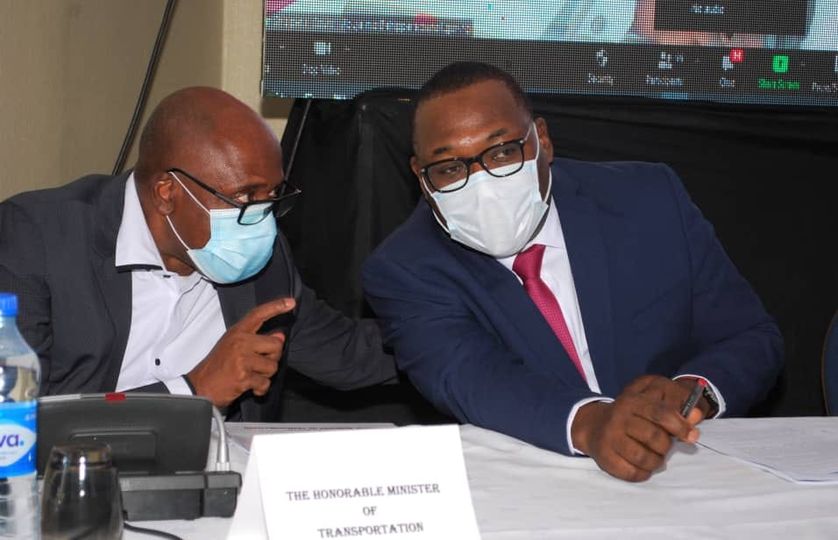…Manual to improve Nigeria’s ranking on Corruption Perception Index
The Nigerian Shippers’ Council (NSC) yesterday in Abuja hosted a sensitization meeting for government agencies and stakeholders in the maritime sector on the implementation of the Nigerian Ports Process Manual (NPPM).
The meeting was held at the instance of the Minister of Transportation, Rt. Honorable Chibuike Amaechi who attended in person along with the top echelon of the transportation ministry to underscore the importance of the NPPM and the need to sanitize Nigeria’s port system.
A major highlight of the meeting was the presentation of the Port Service Support Portal (PSSP) which will be the primary tool to drive the implementation of the NPPM.
It may be recalled that the NPPM was launched by the Vice-President, Professor Yemi Osinbajo on December 9, 2020 in Abuja while announcing the appointment of Nigerian Shippers’ Council as the lead agency to implement the NPPM. The NPPM will enable Nigeria improve its ranking on the Corruption Perception Index, CPI.
Honorable Minister of Transportation, Rt. Hon. Rotimi Amaechi, in his keynote address emphasized the enormity of the responsibility placed on the Nigerian Shippers’ Council for driving the process and urged government agencies and the generality of the public to cooperate with NSC.
On his part, the Executive Secretary and Chief Executive Officer of the Nigerian Shippers’ Council, Mr. Hassan Bello said that the Nigerian Ports Process Manual was key to transparency in Nigerian ports noting that “there is a need to reduce dual time of cargo from 21 days to the regional average of 7 days.”
He stated that NSC was not only looking at the ease of doing business but at the cost of doing business adding that the electronic call up system by the Nigerian Ports Authority (NPA) would aid in easing the current traffic situation around the port.
He sought for the cooperation of sister agencies to ensure the manual was fully implemented in order to improve the ranking of Nigeria in the Corruption Perception Index (CPI).
Also speaking, the Chairman, Independent Corrupt Practices and Other Offences Commission (ICPC), Professor Bolaji Owasanoye observed that “The agencies are not powerless, they have enforcement power, it is time to effectively use these enforcement powers.”
He pledged the support of his agency to the implementation of the NPPM.
The Head Technical Unit on Governance and Anti-Corruption Reforms (TUGAR), Ms. Lillian Ekeanyanwu applauded the collaboration between the NSC and other agencies in realizing the NPPM stating that “we have confidence in the NSC and NPA and we would issue a scorecard on performance.”
The Director General, NIMASA, Dr. Bashir Jamoh who spoke on some of the challenges in the sector listed insecurity and corruption as the major drawbacks of the industry. According to him, the methods of addressing these issues were embedded in the NPPM.
“Our industry can only be sustained in terms of economic growth if we have sustainable systems in place to make our ports attractive”, he said.
The Governor of Lagos State, Mr. Babajide Sanwo-Olu who was represented at the meeting by the Lagos State Commissioner of Transportation, Dr. Fredrick Oladeyinde said that the Lagos state was on top of the Apapa gridlock situation.
““We are working with the NPA to make sure truck parks are established along logistics routes. Lagos has given out 31 hectares of land for these truck parks for instance. We will continue to work with key stakeholders to ensure we develop the best port system in Africa”, he said.
Managing Director of the Nigerian Ports Authority (NPA), Hadiza Bala Usman pointed out that the Key Performance Indicators (KPI) of the various agencies in the maritime sector were closely tied therefore the need for seamless cooperation and integration of relevant agencies. The NPA, she promised would ensure compliance to the manual and implement sanctions for non-compliance.
For the Comptroller General of the Nigeria Customs Service (NCS), Col. Hameed Ali (rtd.) represented by Acting Comptroller, Tariff, NCS, Suleiman Chiroma, there was the need for the Nigerian Customs Service to deploy sophisticated modern scanners to replace physical examination adding that at the time of physical examination, all relevant agencies should be present and failure to comply would mean exemption.
The Registrar and Chief Executive Officer of the Council for the Regulation of Freight Forwarding in Nigeria (CRFFN), Barrister Sam Nwakohu congratulated the ES/CEO of NSC for a job well started even as he spoke on the importance of collaboration amongst the maritime agencies which freight forwarders rely upon to ease their business.
He added that the manual was a good initiative that would improve the nation’s economy.
Photo: (L-R) The Minister of Transportation, Rt. Hon. Chibuike Rotimi Amaechi in a tete-a-tete with the Executive Secretary of the NSC, Barr. Hassan Bello during the Stakeholders sensitization meeting on Nigerian Port Process Manual (NPPM) in Abuja yesterday.
Send your news, press releases/articles to augustinenwadinamuo@yahoo.com. Also, follow us on Twitter @ptreporters and on Facebook on facebook.com/primetimereporters or call the editor on 07030661526, 08053908817.

